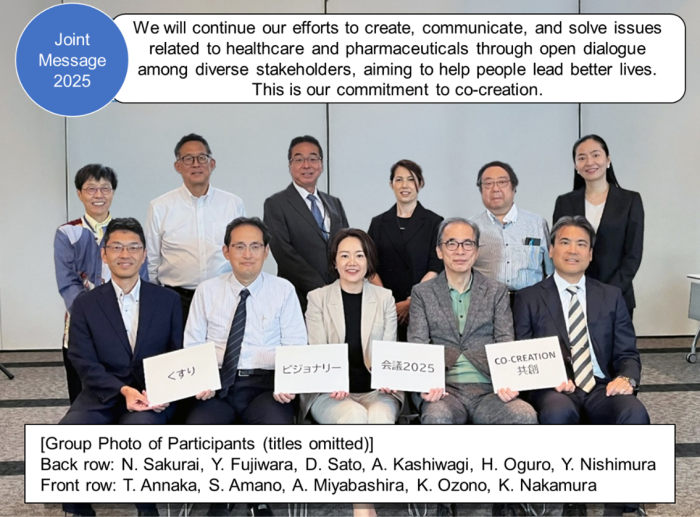Participation in the “Kusuri Visionary Conference 2025”
Expanding the Circle of Stakeholders and Engaging in Discussions Toward Co-Creation
October 16, 2025
Japan Pharmaceutical Manufacturers Association
The Japan Pharmaceutical Manufacturers Association (JPMA) participated in the “Kusuri Visionary Conference 2025” held on September 17, 2025. This conference, first initiated in 2024 by the Japan Federation of Cancer Patient Groups, aims to address social issues related to medicine and healthcare through dialogue and collaboration among diverse stakeholders.
In its second year, the conference brought together eleven participants from nine organizations, including patient groups, medical institutions, and government agencies. The discussions focused on two key themes:
- Approaches to Information Provision (especially clinical trial information)
- Patient Involvement in Drug Research and Development
Highlights from the Discussion
- Improvements to the “jRCT” (Japan Registry of Clinical Trials) system are underway, with expectations for better access to clinical trial information. Future enhancements may include personalized trial information and AI-powered search functions.
-
The “Rare Disease Clinical Trial Web” has been launched, but challenges remain in raising awareness and improving search functionality.
- In order to improve access to clinical trial information, discussions are underway, moving toward the view that information on clinical trials registered in the jRCT does not qualify as advertising.
- Efforts to involve patients in drug development are expanding. To further enhance these efforts, clear and accurate information dissemination, improved health literacy, and deeper societal understanding and support are essential.
- Medical and nursing education should incorporate systems to teach the importance of drug development and patient involvement.
At the conclusion of the conference, participants unanimously agreed on an updated joint message emphasizing the importance of:
- Clarifying stakeholder roles
- Strengthening communication with society

JPMA will continue working toward solving issues related to access to necessary medicines and treatments for patients and their families, aiming to create a more inclusive and supportive society.
Participant Comments
-
Shinsuke Amano (President, Japan Federation of Cancer Patient Groups):
“With the revision of the Clinical Research Act and recent parliamentary discussions confirming the need to advance information sharing on clinical trials, a major shift is underway. Now is the time for patients, healthcare professionals, industry, and government to work together, as this meeting strives to do so.“
-
Takeshi Annaka (Director, Policy Planning Division for Pharmaceutical Industry Promotion and Medical Information Management, Health Policy Bureau, MHLW):
“The first step in patient participation is to communicate your needs and concerns to someone. I want to convey that ‘patient participation’ doesn’t have to be difficult, so that more people feel encouraged to join.”
-
Hiroshi Oguro (President, Japan Patients Association):
“There are many challenges in healthcare and pharmaceuticals, but through candid dialogue with everyone, I saw the potential for the future. I want to continue concrete efforts toward solving these issues. Thank you.”
-
Keiichi Ozono (Head, Center for Promoting Treatment of Intractable Diseases, ISEIKAI International General Hospital):
“I believe that this kind of meeting plays an important role in drug development by enabling individuals from various perspectives— patients and their families, healthcare professionals, pharmaceutical companies, regulatory authorities, and others—to move forward while respecting each other's positions.”
-
Akiko Kashiwagi (Representative, Hidamari Tanpopo – Patient Family Group for Organic Acidemias and Fatty Acid Oxidation Disorders):
“While I appreciate progress in improving public access to clinical trial information and PPI, issues such as information gaps among patients and limited public understanding of drug development and clinical trials were also highlighted. From my role in the patient group, I felt I must keep learning to deliver useful information clearly not only to fellow patients but also to the general public.”
-
Naomi Sakurai (Vice President, Japan Federation of Cancer Patient Groups):
“With the advancement of digital technology, the flow of information will change significantly. I was reminded of the need to communicate the ‘vision’ of how our healthcare environment will change when clinical trial information is delivered individually if desired in a push-based format.”
-
Daisaku Sato (Councilor for Pharmaceutical Affairs, MHLW):
“Direct talk helped me understand many things with real senses. Not just imagining, face-to-face dialogue is very important. It made me want to think together about what we can do, rather than why we can’t.”
-
Kenichi Nakamura (Director, Department of International Clinical Development, National Cancer Center Hospital):
“It was a very meaningful time to have honest discussions with various stakeholders. I believe we all share the aspiration to create better medicines, so I hope we can co-create in various settings as partners aiming for the same goal.”
-
Yukiko Nishimura (President and Founder, Specified NPO ASrid) – Moderator:
“This conference showed a cycle of how ‘dialogue’ helps us understand different perspectives, and how ‘continuing’ fosters deeper discussions. I hope we can continue candid dialogue, leading to meaningful actions.”
-
Yasuhiro Fujiwara (Chief Executive, Pharmaceuticals and Medical Devices Agency (PMDA)):
“To realize a world where everyone can live a healthy life, it’s important for each stakeholder to take ownership and fulfill their roles. PMDA will continue working with everyone to promote patient and public involvement and engagement (PPIE) for a better tomorrow’s normal.”
-
Asuka Miyabashira (President, JPMA):
“I’m grateful for this valuable opportunity to engage in dialogue for addressing issues with diverse stakeholders and to broaden our perspectives. Toward a society where PPI is the norm, we will enhance our ‘ability to disseminate’ and continue co-creating.”

